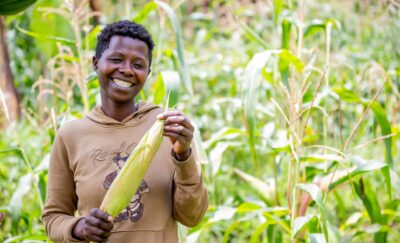News
17 January 2011
Farm Africa launches groundbreaking business model
Farm Africa, a UK non-governmental organisation that is committed to the economic empowerment of Africa’s marginal farmers, today announced that it has received funding to develop the first franchise business model that will establish a chain of new veterinary stores to provide quality, accessible and affordable livestock services including clinical services, veterinary drugs, farm inputs, animal feeds and artificial insemination in Africa.
The franchise model has been devised to ensure scalability and to allow it to become globally applicable across developing countries where the livestock sector can contribute to economic growth and development. Two thirds of the world’s 1.04 billion rural people living in absolute poverty rely on their livestock for their income.
Through a US$5m grant from the Bill & Melinda Gates Foundation Farm Africa will establish at least 150 stores across Kenya over four and a half years to help 300,000 under-served livestock keepers in rural Kenya gain access to affordable livestock products and services.
The social business will draw on over two decades of Farm Africa’s practical experience of establishing sustainable livestock services.
Livestock account for 50% of the agricultural capital stock in sub-Saharan Africa*1. For most smallholder farmers, livestock are the primary household asset as well as providing meat, manure, dairy products, traction and transport. The growing demand for livestock products by urban consumers in Kenya and the region presents an opportunity for the owners of livestock to trade their way out of poverty.
In remote rural areas livestock keepers lack access to high quality, affordable livestock products and services. During the1980s Government veterinary services were scaled back resulting in a lack of suitable livestock services in remote areas. The high demand for animal health products, coupled with a lack of regulation and supervision has led to a thriving market in unqualified and illegal traders who commonly supply and sell sub-standard or out of date products.
The grant from the Bill & Melinda Gates Foundation will help Farm Africa to improve and expand livestock keepers’ access to quality livestock products and services. It will train a network of providers to roll out new ways to improve animal health and production and improve the incomes of livestock keepers.
Farm Africa will work with a range of related projects supported by the foundation. The franchise network will provide a nationwide delivery infrastructure for vaccines developed by GALVmed, as part of their “Protecting livestock, saving human life” project.
“The launch of this innovative social enterprise comes at a crucial moment for the livestock sector in Kenya where there are many new business opportunities for livestock keepers. Our new company will deliver high quality good value products to those currently without them in a financially sustainable manner. The franchising business will open access to the highly dispersed rural market for input suppliers and open up new livestock marketing opportunities. The new business will help farmers overcome constraints to livestock health and productivity, so improving the food security of livestock keepers and their income and welfare. This new approach to delivering services in rural areas is sustainable and we anticipate it will be scalable across Africa.” said Dr Christie Peacock, former CEO, of Farm Africa who has moved over to Chair the new livestock franchise business.
“The livestock sector in Kenya contributes 5% of the gross domestic product, making up 22% of total agricultural GDP*2. To support poverty reduction in Kenya, the huge potential of the country’s livestock sector must be supported through modernisation, appropriate technology and improved access to high quality animal health services and inputs. The livestock sector provides impetus for economic development. Therefore the grant will help Kenyan livestock keepers to overcome hunger and poverty.”
“Livestock are a vital asset for many smallholder farmers in developing countries,” said Gregg BeVier senior program officer for the Agricultural Development initiative for the Bill & Melinda Gates Foundation. “Through establishing financially viable stores in Kenya, poor farmers will have the tools to improve the health of their livestock, increase incomes, and build better their lives for themselves and their families.”
Steve Sloan, Chief Executive, of GALVmed said, “I am truly delighted to hear the news of Farm Africa’s recent grant from the Bill & Melinda Gates Foundation and both pleased and proud that GALVmed played a small part in the early days of this development. The work of GALVmed and Farm Africa has always been seen as complementary and this development will significantly enhance the capacity to bring products to the market for the benefit of Africa’s poor farmers and to increase the sustainability of the income of livestock keepers.”
This grant is part of the foundation’s Agricultural Development initiative, which is working with a wide range of partners to provide millions of small farmers in the developing world with tools and opportunities to boost their yields, increase their incomes, and build better lives for themselves and their families. The foundation is working to strengthen the entire agricultural value chain—from seeds and soil to farm management and market access—so that progress against hunger and poverty is sustainable over the long term.
About the business
Farm Africa aims to establish at least 150 livestock franchises and will work with public and private partners to improve the incomes, welfare and household of 300,000 livestock keepers in Kenya, by significantly improving access to affordable livestock products and services from a quality controlled financially viable franchise business model. www.farmafrica.org.uk
1 Delgado, C.L, Narrod, C.A, Impact of changing market forces and policies on structural change in the livestock industries of selected fast-growing developing countries FAO, 2002.
2 Statistical Abstract, Kenya National Bureau of Statistics, 2008




